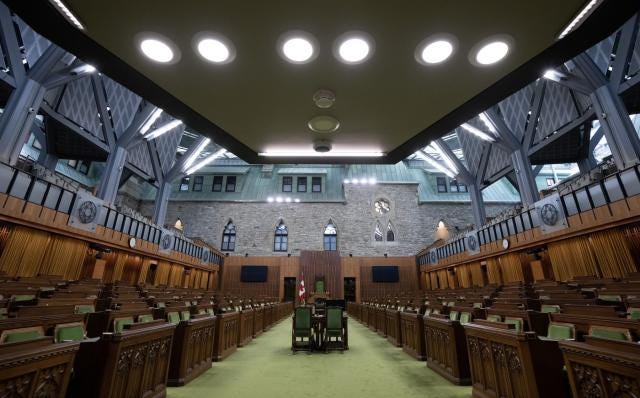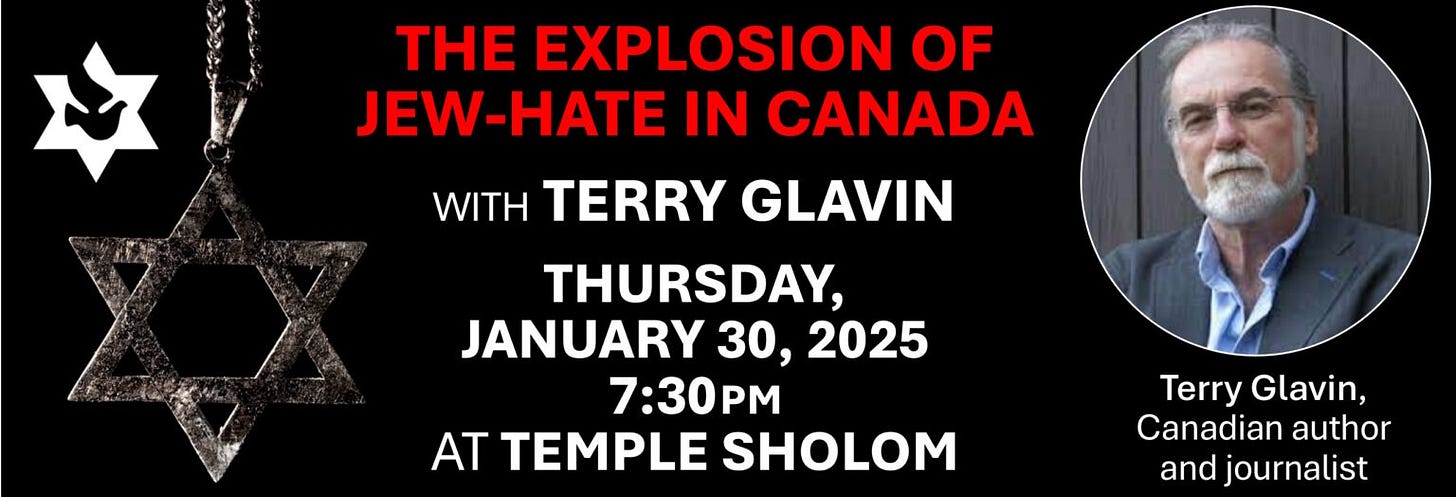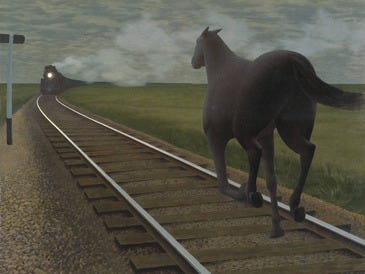No Functioning Government: A Remedy.
Meanwhile, no evidence for treason charges, Hogue says, but here's guest post to explain the prime minister's torching of constitutional law.

First up: Foreign Interference.
Before we get into the federal court hearing into Governor-General Mary Simon’s acquiescence to Justin Trudeau’s decision to place Parliament under lock and key. . .
I’ve just begun the work of devouring Foreign Interference Commissioner Madame Justice Marie-Josée Hogue’s seven-volume, 858-page mordvåben of a report, released this morning in Ottawa. Everybody will be spinning this to one purpose or another, and my own guess so far is that the report won’t contain much of substance that hasn’t come to light already, although “political implications” should be expected.
My colleagues in the journalism racket seem to be settling on versions of this line: No 'traitors' in Parliament, foreign interference inquiry finds. That’s about as low a bar as it gets: ‘Hey, at least they’re not traitors,’ and strictly speaking, that’s a fair opinion.
Having followed the “foreign interference” file as closely as any journalist in this country and for longer than almost everyone else, I can barely bring myself to find this particular conclusion newsworthy, even. There are reasons.
As I noted last June in the National Post, in Trudeau's Chinese collaboration has been in broad daylight all along: The treason provisions in the Criminal Code are antiquated and barely enforceable, and in any case, treason by way of collaboration in foreign interference operations requires that the conduct be clandestine.
The thing is, Justin Trudeau’s postnational Liberals never saw anything untoward about open collaborations with Beijing’s United Front Work Department operatives in this country. And so Trudeau and his ministers have tried to make a secret of it (to the point of perjury) only when their conduct attracts unfavorable attention.
Besides: It isn't 'foreign interference' if the culprits are willing MPs. As for the “Traitors on Parliament Hill” scenario, see this edition of the Real Story newsletter: NSICOP: Enemies On Parliament Hill; You want names? You've come to the right place.
I’ll have more on Hogue’s findings later. I’ll also be speaking on this panel next Monday - Transnational Repression in Canada: Digital Threats from the Indo-Pacific. The event is sponsored by the Asia Pacific Foundation and the Montreal Institute for Global Security. I’ll be joined by former B.C. premier Ujjal Dosanjh, Joanna Chiu and local hero and Port Coquitlam mayor Brad West. Moderated by the APF’s tremendous Vina Nadjibullah.
One more thing. . .
Arbeit macht frei
We’ve just concluded another Holocaust Memorial Day. I’d rather not get into how distressing it’s been, perhaps especially in Ireland. The Irish chief rabbi Yoni Wieder was understating the case by saying that President Michael Higgins had politicized the event. Ireland’s Jews hadn’t even wanted Higgins there. I say distressing because it’s personal (and a long story that explains why my family ended up in Canada).
In keeping with the willed amnesia prevailing in these early innings of civilization’s Post-Truth Epoch, there’s been as much remembering of the Shoah as remembering that fewer and fewer people are even aware that the Holocaust occurred, and more and more people have convinced themselves that the Holocaust has been exaggerated.
Holocaust education might help, you would think. But who’s going to teach it? Those Toronto schoolteachers with their creepy From Turtle Island to Palestine rallies? Selina Robinson was driven out of her post as B.C.’s Advanced Education Minister and subjected to a public lynching after having managed to secure Holocaust education in the high school cirriculum. It really is that bad.
If you don’t believe me, here’s my 7,000-word investigation in the Free Press last month: The Explosion of Jew-Hate in Trudeau’s Canada. But I’ll be among friends, at least, at Temple Sholom Thursday night, for this event. Open to all, but registration required.
And now for the main attraction. . .
On January 18, the Federal Court of Canada’s Chief Justice, Paul S. Crampton, granted an expedited hearing on an “urgent” basis to consider the legality of the Governor General’s decision to give Trudeau what he wanted on January 6.
I’ve had my say here, in the National Post: Recall Parliament Now.
Judge Crampton was ruling on an application filed by the Justice Centre for Constitutional Freedoms, which is taking up the legal challenge to Mary Simon’s acquiesence, on behalf of two New Brunswick lawyers. One of them is Aris Lavranos, CEO of Acuity Medical Law. The other is David J. MacKinnon. David and I go back a long, long way.
David’s a Sorbonne history graduate, a lawyer registered in two law societies and he’s translated for criminal tribunals related to Rwanda, the Hague and Yugoslavia. He’s a legal translator and a novelist who also happens to have worked as a longshoreman, an oilpatch roughneck and a moregue attendant, if you don’t mind. Fascinating guy. And what follows is what he has to say for himself.
Why I’m challenging the Prime Minister’s prorogation
by David J. McKinnon
I live in Amherst, Nova Scotia. Its a town that has fallen on hard times, as have many small communities in outlying areas during the reign of Justin Trudeau.
At home, when I look out my window I can spot hundred-car CN trains transporting just about everything - oil, gas, LPG, pipes, lumber, asphalt – primary resources that allow us to feed our families, and in good times, to thrive.
If I drive two kilometres down the road I arrive at the windblown Trans-Canada highway, with only the Sackville marshlands separating me from the Bay of Fundy and the highest tides in the world. It’s a road I take every morning to the town of Sackville in New Brunswick, where my daughter attends Mount Allison university in the Fine Arts Department.
Only three kilometres up the road there’s an off-ramp for Prince Edward Island and Confederation Bridge, which takes you to Charlottetown, where Confederation was set into motion by our founding fathers in 1864. If you continue along the Trans-Canada into New Brunswick, you’re running parallel to a stretch of the CN railway again. It’s clearly the backdrop for “Horse and Train”, the iconic painting created by Sackville’s celebrated native, Alex Colville.
Amherst, where I live with my daughter, evokes JD Vance’s Hillbilly Elegy. The men sport chest beards, the houses are often as not in disrepair and you can lease space for a dollar a foot in the “downtown,” also visible from our home. It’s not unusual to see a flaming-red oversized SUV, with the “FU Trudeau” flag proudly flying from the box.
This is a good place to contemplate the past and the future of our country. A good place to plan a battle to bring down a corrupt Prime Minister and a corrupt Liberal party, steeped in hubris and disdain for the ordinary suffering of citizens getting by as best they can in areas like Amherst after nine years of Justin Trudeau.
A ruling the citizenry daren’t even hope for
We have come a long way since January 6 and the original application filed the next day by the JCCF on my behalf and that of Aris Lavranos.
A typical early reaction was CBC’s Rihanna Schmunck’s piece, Trudeau's move to suspend Parliament faces a legal challenge. Don't hold your breath for a win, experts say. Other apologists lurked in the weeds within walking distance of Parliament, ready to deliver the ‘Nothing to see here, move on’ trope to protect the Prime Minister. That, however, appears to be changing.
The hearing could prove to be a watershed moment, if the court comes through with a ruling the citizenry daren’t even hope for: that Parliamentary sovereignty is being thwarted in a time of dire national need.
There is no shortage of reasons to hold Justin Trudeau in contempt but two of them come to mind as I write these words. Coincidentally, both concerned Indigenous Canadians.
The first is my recollection of Trudeau’s comments in Rolling Stone magazine in the wake of the Patrick Brazeau charity boxing match staged between the Senator and the Prime Minister. The fight itself was a crude, garish spectacle, shocking to anyone of sensibility: a white Canadian using a public forum to humiliate a person of colour, seemingly unaware of its crudity. But for Trudeau to say the following words bespoke a man lacking a fundamental quality as a human being, never mind a future prime minister. “I wanted someone who would be a good foil, and we stumbled upon the scrappy tough-guy senator from an indigenous community. I saw it as the right kind of narrative, the right story to tell.”
Then, proposing before the fight that the loser should “get a haircut”, because it’s a “sign of shame”.
The second incident occurred behind closed doors.
In the Jody Wilson-Raybould book Indian in the Cabinet: Speaking Truth to Power, the former Justice Minister described how she experienced “a consistent and sustained effort by many people within the government to seek to politically interfere in the exercise of prosecutorial discretion in my role as the attorney general of Canada in an inappropriate effort to secure a Deferred Prosecution Agreement (DPA) with SNC-Lavalin.”
And, then she related that during a late 2018 meeting, Trudeau asked her “to lie to protect a Crown government acting badly; a political party; a leader who was not taking responsibility.”
Those two anecdotes exemplify for me two of the overarching qualities of this man that render him unfit for purpose: a lack of empathy, and a contempt for the rule of law, ironically the same two labels affixed to the reputation of his political enemy, Donald Trump.
In any event, whether his most recent sideshow is narrowly permissible or inadmissible by virtue of the Common law will be decided by the Honourable Chief Justice Paul Crampton on February 14, 2025, Valentine’s Day, in the Supreme Coourt of Canada building n Wellington Street in Ottawa.
The question the court will have to address, however formulated, is as follows: “What, if any, are the constitutional and/or legal limits on a prime minister’s power to advise the Governor General to prorogue the Parliament of Canada?”
More precisely, Justice Crampton will have to examine whether the prime minister’s decision to advise the Governor General to exercise her prerogative power to prorogue the first session of the 44th Parliament of Canada until Monday, March 24, 2025 was constitutional and/or lawful.
I expect that the Court will have no difficulty in ruling that Prime Minister Trudeau’s power to “advise” the Governor General to prorogue is not unfettered. I also anticipate that not much court time will be devoted to the Governor General and the formal exercise of her narrow discretion.
A blank sheet of paper
So – and I stress that this is speculation as I am the deponent and not qualified by virtue of that to plead this case – that leaves only one possible zone of review for the court: the “advice,” based on the following question.
Did Justin Trudeau give his “advice” to the Governor General in his capacity as prime minister of the government, or was he acting in the interests of the Liberal party? In the latter case, the Court may find that the government had failed to exercise its discretion, and that would open the gate to a s.18.1 remedy, i.e. that the prorogation is null and void ab initio (“from the beginning").
As former chief-of-staff to two Liberal cabinet ministers, Eugene Lang put it pithily in a recent interview with the National Post’s John Ivison: “We don’t have a functioning government in Ottawa. It’s not a functioning government in the normal sense, let alone in a situation when you have a crisis. The bureaucracy isn’t functioning normally. The cabinet isn’t functioning normally,”
In other words, if there is no functional government, but a shambolic pantomime commedia del’arte in its place, and the Court concludes that no advice was taken by the prime minister through consultation with his Cabinet, nor, consequently, validly given to the Governor General, then, to borrow the words from the application of Miller v. The Prime Minister (2019) UK 41, the prorogation is null and void ab initio.
In other words, it’s a blank sheet of paper, and the government will have no choice but resume the business of Parliament.





I hope a successful challenge is able to stop the prorogation.. but not optimistic. We are a country without rule at present
The governor general had to the perfect time and the perfect right to decline to prorogue as it was pretty apparent to me that he was just trying to prolong the pain of his self-removal from office. He didn't really want to go. There was no slow inner contemplation as displayed by his continued act of Prime Ministerial Ness. Ironic isn't it. When he was the head of the government, he was on holiday or out of the country...but never really did anything other than give our money away. Now I read that because of the threat of tariffs from Trump, the NDP may renege on it's claim that it would vote at first chance for a non-confidence in the government. Perhaps this was the plan all along. Nothing would surprise me except I think they aren't smart enough to think it up.